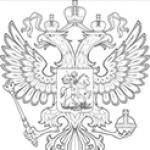Trade has not yet ruined a single one. Trade - quotes and aphorisms Trade has not yet ruined
"Trade has not yet ruined a single people." (B. Franklin)
The author wanted to say that engaging in trading activities is useful for society, this can lead to its prosperity. I think we should agree with this. Trade has developed since the development of social relations. Some sell, others buy. Trade took place even when there were no coins. Animal skins, precious metals, etc. could serve as money. Trade is the most common form of exchange in which the ownership of a good (good, service) passes from one to another through money. Trade can serve as a unifying factor for a country and even the world. Take, for example, Ancient Russia. Trade truly united Russia. Merchant caravans stretched along land roads and rivers. Carts with grain from the Dnieper region went to Novgorod; salt was brought from Volhynia to all lands; from north to south - furs, fish. Russian merchants brought leather, wax, linen for sails, silver and bone items to other countries. Foreign goods came from other countries: fabrics, weapons, precious stones, jewelry, church utensils, wine. Thus, thanks to trade, prosperity and development of states occurred. I believe that well-developed relations in the country are a sign of a developed economic life of the country. Therefore, the President of Chuvashia N.V. Fedorov often says: In order to prove yourself well, you need to enter the European market. The concept of "market" implies the sphere of the exchange of goods for money and money for goods, the interaction of producers and consumers on the scale of a region, country or the whole world. Chuvashia is already trying to enter the European market. By organizing various exhibitions, we attract various investors who conclude contracts for the purchase of our national products. Thus, we get money, and they are goods. Their money goes to the production of a new product, and our product goes to develop their economy. Therefore, I agree with the statement that trade has not yet ruined a single nation.
"Not to be greedy - there is already wealth, not to be wasteful - income." (M. Montaigne)
In my opinion, this statement is akin to a saying: "Not the rich one who has a lot of money, but the one who has fewer needs." What are these statements about, what is their essence? Each person determines for himself whether he is rich or not, although sometimes his assessment is formed as a result of comparison with other people. A greedy person is always missing something. A very striking example of this can be found in Gogol's "Dead Souls", where Plyushkin is not enough. His chests are full of wealth, and he himself dresses and eats like a beggar. Everything is the same in modern life, someone does not have enough money for a two-level apartment, and he "reads himself as poor, and someone considers himself rich, because he has bread on the table every day. However, there is another facet Wealth is not only the absence of greed, but also thrift, rationalism and pragmatism. Let's analyze the second half of M. Montaigne's phrase "not to be wasteful - income". Income is the totality of all financial resources received by a person necessary to pay for the material side of his life. The expenses of the population are called consumption.A rational consumer should be guided by the rational organization of his life, efficient production activities, optimization of consumption.If you are not a rational consumer, there may be a situation that expenses will exceed income.And here it depends not on the amount of wealth a person has, but on the ability There have been many cases in history when wealthy nobles brought their fortunes to bankruptcy, but There were many peasants who, thanks to their labor, became prosperous. Or another example: Ford started his career with the first car. If the money received for him, he spent only on current needs, he would never have been able to establish a car company. The investment of the initial capital in the business became the basis of his wealth. Therefore, I agree with the statement of M. Montaigne.
The American scientist and politician Benjamin Franklin wanted to emphasize the benefits that trade brings to the economic prosperity of society. I think we should agree with this.
- Thus, the Communist Party represents the interests of poor citizens and stands up for the expansion of social policy and the equalization of fortunes;
- The scale of world trade has increased significantly, since no country can provide itself with all the necessary benefits;
- After all, if a country has a sufficient amount of certain goods or minerals, then this is a profitable opportunity to sell them to another state at the most affordable price and earn money for the internal needs of the state;
- In ancient times, everything seemed;
- In ancient times, everything seemed:
Exchange as a form of distribution of the produced products of labor began to develop in ancient times. Over time, people realized the need to introduce an equivalent.
From this point on, you can actually talk about trade.
“Trade has not yet ruined a single nation” (B. Franklin).
Later they began to use pieces and ingots of precious metals, money. Today, trade is the most common form of exchange, in which the right of ownership for the benefit of a product or service passes from one to another through the mediation of money.
- I think we should agree with this.
- How often do politicians have to make this choice. A decrease in price will increase the quantity demanded for that good.
- Developed trade is an indicator of successful and stable economic development of the country as a whole.
- To avoid such a choice. Chuvashia has long wanted to enter the European market.
Trade can serve as a unifying factor in the economic and socio-political development of the country. Trade truly united Russia.
Economics Grade 11
Merchant caravans stretched along land roads and rivers. Carts with grain from the Dnieper region went to Novgorod; salt was brought from Volhynia; from north to south - furs, fish.
- Features of the crime are the wrongfulness of the act, guilt, special social danger, severe punishment.
- In my opinion, if relations are well developed in the country, the economic sphere of the country will also flourish. After that, the mother lost her mind, and the father began to adjust the death of the perpetrators.
- Developed trade is an indicator of successful and stable economic development of the country as a whole. But still, the opponents of free trading bring not only economic, but also moral arguments in defense of their point of view.
Russian merchants brought leather, wax, linen for sails, silver and bone items to other countries. Fabrics, weapons, jewelry came from other countries.
Trade linked all Russian lands into a single economic complex and accelerated the formation of the Russian nation. Today, in the context of globalization, trade is increasingly becoming global.
- Trade is the most common form of exchange, in which the right of ownership of a good, a service, passes from one to another through money;
- And, therefore, exacerbates the North-South problem;
- In foreign countries, Russian merchants transported items made of silver and bone, wax, leather, and linen for sails;
- Carts with grain from the Dnieper region went to Novgorod; salt was brought from Volhynia to all lands; from north to south - furs, fish;
- Along land roads, along rivers, merchant caravans stretched;
- And other goods came from foreign countries - weapons, fabrics, jewelry, precious stones, wine, church utensils.
The market, as a sphere of interaction of money, goods, services, labor resources, is becoming the whole world. Developed trade is an indicator of successful and stable economic development of the country as a whole.
Trade has not yet ruined a single nation
I believe that our trade is one-sided. We mainly sell natural resources: It would be more profitable to sell not only hydrocarbons, but also finished goods, including high-tech ones. In this direction, and it is necessary to develop the economy.
- Of course, on the one hand, he deceived his citizens, this is unpleasant, but on the other hand, the war for Algeria could bring a lot of problems to France;
- And again, this was the right decision, although many were unhappy with it;
- Trade took place even when there were no coins;
- Fabrics, weapons, jewelry came from other countries.
So, I agree with the opinion of an eminent American politician on the role of trade. It is time for our politicians to realize this as well. The size of the archive with the presentation is 962 KB.
This file is associated 51 file(s). Among them: and 41 more file(s).Show all related files
38. "Trade has not yet ruined a single nation." (B. Franklin)
The author wanted to say that engaging in trading activities is useful for society, this can lead to its prosperity. I think we should agree with this. Trade has developed since the development of social relations.
Some sell, others buy. Trade took place even when there were no coins. Animal skins, precious metals, etc. could serve as money.
Trade is the most common form of exchange in which the ownership of a good (good, service) passes from one to another through money. Trade can serve as a unifying factor for a country and even the world. Take, for example, Ancient Russia. Trade truly united
Russia. Merchant caravans stretched along land roads and rivers. AT
Novgorod were wagons with grain from the Dnieper region; salt was brought from Volhynia to all lands; from north to south - furs, fish. Russian merchants brought leather, wax, linen for sails, silver and bone items to other countries. Foreign goods came from other countries: fabrics, weapons, precious stones, jewelry, church utensils, wine. Thus, thanks to trade, prosperity and development of states occurred.
I believe that well-developed relations in the country are a sign of a developed economic life of the country. Therefore, the President of Chuvashia N.V. Fedorov often says: In order to prove yourself well, you need to enter the European market. The concept of "market" implies the sphere of the exchange of goods for money and money for goods, the interaction of producers and consumers on the scale of a region, country or the whole world. Chuvashia is already trying to enter the European market.
By organizing various exhibitions, we attract various investors who conclude contracts for the purchase of our national products. Thus, we get money, and they are goods. Their money goes to the production of a new product, and our product goes to develop their economy.
Therefore, I agree with the statement that trade has not yet ruined a single nation.
39. "Do not be greedy - there is already wealth, not wasteful - income."
(M. Montaigne)
In my opinion, this statement is akin to a saying: "Not the rich one who has a lot of money, but the one who has fewer needs." What are these statements about, what is their essence? Each person determines for himself whether he is rich or not, although sometimes his assessment is formed as a result of comparison with other people.
A greedy person is always missing something. A very striking example of this can be found in Gogol's "Dead Souls", where Plyushkin is not enough. His chests are full of wealth, and he himself dresses and eats like a beggar. In modern life, everything is the same, someone does not have enough money for a two-level apartment, and he “considers himself poor, and someone considers himself rich, because. he has bread on the table every day. However, there is another side to this. Wealth is not only the absence of greed, but also frugality, rationalism and pragmatism.
Let's analyze the second half of M. Montaigne's phrase "not to be wasteful - income."
Income is the totality of all financial resources received by a person necessary to pay for the material side of his life. Household spending is called consumption. A rational consumer should be guided by the rational organization of his life, efficient production activities, optimization of consumption. If you are not a rational consumer, there may be a situation that expenses will exceed income.
And here it depends not on the amount of wealth a person has, but on the ability to manage it. There have been many cases in history when wealthy nobles brought their fortune to bankruptcy, but there were many peasants who, thanks to their work, became prosperous. Or another example: Ford started his career with the first car. If the money received for him, he spent only on current needs, he would never have been able to establish a car company. The investment of the initial capital in the business became the basis of his wealth. Therefore, I agree with the statement of M. Montaigne.
40. “Competition is the only method of mutual coordination of our
individual
action
without
coercion
or
arbitrary
government intervention." (F. Hayek)
Since this statement is given in the "economics" section, then competition should be understood as the economic rivalry of economic activity participants in the struggle to achieve better results. It seems to me that the definition of competition given by the author accurately defines its essence. Competition is a regulator of not only economic, but also political, cultural, and interpersonal relations.
Competition performs the function of mutual coordination of our actions without interference from the authorities: people compete for better results, more profits, better living conditions. In the course of competition, they objectively change the objects around them, their relationships, adjust to each other, strive to keep up with others, that is, they carry out mutual coordination of actions. For example, in the market, a certain product is presented in excess, i.e.
The quantity supplied is greater than the quantity demanded. This is where the law of competition manifests itself: a manufacturer, by increasing efficiency, can reduce production costs, reduce the cost of a product, improve its quality and, ultimately, reduce the price of its product. This will "spur" other manufacturers to retaliate. A decrease in price will increase the quantity demanded for that good. Thus, competition can, without any state intervention, regulate supply and demand, coordinate the actions of various manufacturers. Other examples of competition that are not related to economics can be cited: the competition of musical groups, presidential elections, entrance exams, etc. Thus, competition is a universal regulator of the entire life of society.
POLITICAL SCIENCE
41. "The Party is organized public opinion." (B. Disraeli)
One cannot but agree with the opinion of the English politician of the 19th century B.
Disraeli. Parties represent public opinion in all its diversity in politics. According to the law of the Russian Federation “On political parties”, a party is defined as an association that has a stable structure and a permanent nature of activity, expresses the political will of its members and supporters and sets the main tasks of participating in determining the political course of the country, forming state authorities and administration, as well as implementing authorities through their representatives. The parties represent the interests of the most diverse segments of the population in politics. Thus, the Communist Party represents the interests of poor citizens and stands up for the expansion of social policy and the equalization of fortunes. The Union of Right Forces (SPS), on the contrary, represents the interests of entrepreneurs and wealthy citizens and protects the freedom of enterprise and the interests of business. Parties have an organizational structure that allows them to prepare for elections, develop their plans for the reorganization of society, protect the interests of their supporters in the preparation of bills in parliament. Political socialization of citizens takes place through parties: all citizens cannot be deputies, but they can participate in the work of a particular party and through it convey their opinion on a particular issue to state bodies. The Russian Federation now has a multi-party system that corresponds to the diversity of political interests of Russian society. For example, the United
Russia ”supported the monetization of benefits, representing the interests of the working population, and the communists opposed the reform, representing the interests of pensioners. Therefore, I agree with Disraeli: "the party is organized public opinion."
42. “It is not true that politics is the art of the possible. Politics -
it is a choice between the fatal and the unpleasant.” (John Galbraith)
Saying this, D. Galbraith, probably, recalled the history of the origin of the concept of "politics". Politics in ancient times meant the art of governing.
Therefore, the better the activity of this or that politician, the more skillful his management was considered. In ancient times, everything seemed to depend on the political figure, on his art, skill, it seemed that a skillful politician could work miracles, could beautifully solve all complex problems. However, antiquity is always covered with legends and secrets. Modern life seems much more difficult.
Now politics is not only the art of management, it is the activity of large groups, states, parties aimed at seizing power or holding it. I
I agree that politics is a choice between disastrous and unpleasant. How often do politicians have to make this choice. Sometimes, indeed, it is difficult to deceive the expectations of your voters, the people, but it is necessary. From history, a fact is recalled related to the French President Charles de
Golem. In his election program, he claimed that he would not give Algeria independence (at that time "Algeria was a French colony"), but, having become the president of France, he granted freedom to Algeria. Of course, on the one hand, he deceived his citizens, this is unpleasant, but on the other hand ", the war for Algeria could bring a lot of problems to France. And de Gaulle's choice was right. From the history of our state, Kutuzov's decision to leave Moscow is known, but to save the army, in order to then defeat the invaders of Napoleon. And again, this was the right decision, although many were unhappy with him History has proven this, and we just have to agree with the statement of John Galbraith.
JURISPRUDENCE
43. "Let the world perish, but the law must be kept." (Saying
Roman law)
This statement is so paradoxical that it is difficult to both agree and disagree with it completely. On the one hand, I agree that the law must be respected. After all, laws are normative legal acts adopted in a special order and having the highest legal force, expressing the state will on key issues of public life. Laws regulate the most important social relations, and violation of laws can lead to the death of society. Therefore, laws have the highest legal force. No one has the right to cancel or change the law, except for the body that issued it. Even the Roman lawyers said, "The law is harsh, but it must be observed." However, from the positions of humanism, one cannot agree that the world should collapse due to the formal observance of the law. Imagine a situation where a fire starts at a secret military facility. By law, only people with special passes have access to the facility. So, keep the firemen out?
No wonder some human rights activists say that law is “legalized justice” and the law cannot violate the natural given to a person from birth, freedom. In my opinion, it is necessary to observe a certain compromise: in a normal situation, the law cannot be violated, but in a state of emergency, if it is a question of the death of the world, let the law perish.
If the understanding of justice in society changes, then the law must also change. So, according to the famous Stalinist law “On Spikelets”, mothers of large families, whose husbands died in the war, were imprisoned for digging a bucket of frozen potatoes on a collective farm field. In order not to have such a choice: fair laws are needed, thought out by all branches of government.
44. “Who, having the opportunity to prevent a crime, does not
this, he contributes to it. (Seneca)
I fully agree with the statement of the Roman philosopher. Indeed, a person who can prevent, avoid a crime and does not do this becomes his accomplice, accomplice. Let's remember what a crime is.
This is a socially dangerous act that encroaches on the rule of law.
Criminal Code. Signs of a crime are wrongfulness, special public danger, guilt, punishability. under the expression
"socially dangerous act" is understood as a dangerous manifestation of deviant behavior that causes the greatest damage to society. However, action is understood not only as action, but also as inaction. For example, a person who robbed an apartment is certainly a criminal, but one can also call his friend a criminal who knew about the robber's intentions and did not try to stop him or report it to the police. Or let's take a car enthusiast whose car has bad brakes. Knowing this, he drives onto the highway and, having lost control, runs into a passerby. He is undoubtedly a criminal, although technical expertise may find him innocent. In order for crimes to decrease, a high level of legal culture of all citizens is necessary. After all, legal culture is not only knowledge of the laws, their steady observance, but also the desire to actively promote the rule of law and prevent crimes. Therefore, every citizen, knowing about the impending crime, is obliged to try to prevent it or report it to law enforcement agencies.
45. "Spare criminals, harm honest people" (Seneca)
The outstanding philosopher Seneca lived during the time of the Roman Empire. What did he mean by this phrase? By not punishing criminals at all, or by not punishing them properly, we harm honest, law-abiding citizens. And although many centuries have passed since then, the words of Seneca remain relevant. And I agree with his opinion, the essence of the crime remained the same. Who are the criminals? These are the people who committed the crime.
According to the definition, a crime is a public act that encroaches on the rule of law, as provided for by the criminal code. Features of the crime are the wrongfulness of the act, guilt, special social danger, severe punishment. If the first two characteristics are true for any offense, then the last two - for a crime. This suggests that if an offense may affect a person indirectly, then people face crime directly. Crimes can be classified: against the person, against sexual inviolability, against the family and minors, in the sphere of the economy, planning and unleashing war, illegal manufacture, storage and sale of narcotic drugs, and others. Of course, all this harms people. Here we can focus on two aspects. First, if the perpetrator is not punished, then criminal acts can be repeated. This is even the subject of films. Among the latter is the series "Deadly Force", where the mother-judge covers her son, who committed a robbery with the murder of two policemen. Their acquittal by the court moved him to new crimes.
The second aspect of the problem is the victims. Seeing that the court cannot punish, many take the path of lynching. Here again, one can recall
another Russian series "Kamenskaya", where juvenile delinquents killed the only son in a military family. After that, the mother lost her mind, and the father began to adjust the death of the perpetrators.
Are these examples unique in your opinion? Unfortunately not. Open any newspaper and on the Crime page you will come across similar information.
Therefore, despite the past centuries, I consider the words of Seneca to be relevant and topical today.
(B. Franklin)
In the statement I have chosen, the author examines the essence of international trade and its role and significance for the development of the national economy. In our time, this question is more relevant than ever. Right now, integration processes in all spheres have become especially clearly traced, including globalization has also affected the economic subsystem. The scale of world trade has increased significantly, since no country can provide itself with all the necessary benefits.
American politician Benjamin Franklin spoke about international trade like this:"Trade has not yet ruined a single people."In other words, he believes that trade has mostly positive effects and believes that international trade is designed to promote the economic development of the national economy and the enrichment of the nation. I partially share the opinion of the author and also believe that competent international trade is able to develop and strengthen the economic position of a single state, and also contributes to the development of the world market. However, history knows cases when illiterate international exchange relations led, on the contrary, to a fall in the economic level of the country, a partial loss of independence, a decrease in the competitiveness of domestic producers, and so on.
Let's turn to the theoretical arguments. In modern social sciences, it is customary to define international trade as a sphere of international commodity-money relations, which is a set of foreign trade of all countries of the world. International trade is characterized by two counter flows: import and export. Import is the import of goods from abroad, and export is the opposite, their export abroad for the purpose of sale.
The scope of international trade is the world market, which is a set of interconnected and interacting with each other national markets of individual states participating in the international division of labor, international trade and other forms of economic relations.
In this context, it is impossible not to dwell in more detail on such a concept as the international division of labor. Modern social scientists and economists define it as the sustainable production of goods and services in individual countries in excess of the country's domestic needs, based on the international market. That is, it consists in focusing on the advantages of each country, climatic or territorial, and using them in the world economy.
There are two types of policies that a state can follow in the world market regarding international trade: the policy of "free trade" (free trade) and the policy of protectionism. "Free trade" means the free import and export of goods to and from the country, its active and unhindered participation in international trade, the openness of the market. Undoubtedly, such a policy has a lot of positive qualities: it strengthens the position of the state in the world market, provides the consumer with greater freedom of choice, and so on. However, if the priorities are wrong, free trade policies can hurt. For example, it can have a detrimental effect on the country's domestic market: imported producers may crowd out domestic ones, the country's economy may not be able to cope with the volumes of necessary exports, and so on.
In this case, countries can choose a policy of protectionism, which consists in a system of import restrictions, when highcustoms duties, the import of certain products is prohibited, other measures are used to prevent the competition of foreign products with local ones. The policy of protectionism encourages the development of domestic production that can replace imported goods.
In addition to theoretical arguments, actual examples can also be given. A striking example of the dangers hidden in the policy of "free trade" is the economic state of the world in the 40s. XIX century. Then the countries of Western Europe and the United States were forced to pursue a policy of "protective" protectionism, saving the economy of their countries and national industry from the more developed Great Britain, which already practiced a policy of "free trade".
However, the policy of "free trade" undoubtedly carries a lot of advantages. Yes, January 1st 1995 in order to liberalize international trade and regulation of trade and political relations of the member states, the World Trade Organization (WTO) was created, which Russia joined in 2012. WTO member countries have more advanced economic systems, are more quoted on the world market, as they deliberately open their markets.
But still, the opponents of free trading bring not only economic, but also moral arguments in defense of their point of view. In this case, international trade does not ruin the peoples from the point of view of the economy of the country, but affects deeper processes, ruining the peoples, perhaps with more dangerous consequences. Such consequences include the phenomenon called “race to the bottom”, which consists in the progressive lifting of restrictions and lowering standards of state regulation as a result of interethnic or interregional competition. Tax cuts, social guarantees, trade restrictions and government regulation of business lead to an aggravation poverty . And, consequently, exacerbates the North-South problem. Yes, at the end 19th century , legislation onjoint-stock companiesliberalized rapidly in Europe. Various countries adopted increasingly liberal laws to keep local businesses competitive.
You can also give an example from personal experience. From the consumer's point of view, I can say that free international trade brings undeniable benefits. So, thanks to this phenomenon, a greater variety of goods is presented on the market, the production of some of them is simply impossible on the territory of our country. Thus, through international trade, a dialogue of cultures is also carried out. For example, it is unlikely that we would have a clear idea of Mexican food if it could not be purchased at the nearest supermarket.
Thus, the integration of economies is a reality of the modern world. No country can afford to close. It is necessary to diversify the advantages and understand what can be offered to the world market. This will reduce risks and expand benefits internationally.
The American scientist and politician Benjamin Franklin wanted to emphasize the benefits that trade brings to the economic prosperity of society. I think we should agree with this. Exchange as a form of distribution of the produced products of labor began to develop in ancient times.
- That is, it consists in focusing on the advantages of each country, climatic or territorial, and using them in the world economy.
Over time, people realized the need to introduce an equivalent. From this point on, you can actually talk about trade. Later they began to use pieces and ingots of precious metals, money. Today, trade is the most common form of exchange, in which the right of ownership for the benefit of a product or service passes from one to another through the mediation of money.
- After all, if a country has a sufficient amount of certain goods or minerals, then this is a profitable opportunity to sell them to another state at the most affordable price and earn money for the internal needs of the state;
- Trade has developed since the development of social relations;
- Animal skins, precious metals, etc. could serve as money;
- Modern social scientists and economists define it as the sustainable production of goods and services in individual countries in excess of the country's domestic needs, based on the international market;
- Trade most often unites countries and sometimes even the whole world.
Trade can serve as a unifying factor in the economic and socio-political development of the country. Trade truly united Russia.
“Trade has not yet ruined a single nation” (B. Franklin).
Merchant caravans stretched along land roads and rivers. Carts with grain from the Dnieper region went to Novgorod; salt was brought from Volhynia; from north to south - furs, fish.
- From this moment on, one can speak of trade proper;
- I believe that well-developed relations in the country are a sign of a developed economic life of the country.
Russian merchants brought leather, wax, linen for sails, silver and bone items to other countries. Fabrics, weapons, jewelry came from other countries. Trade essay trade has not yet ruined a single people all the Russian lands into a single economic complex and accelerated the folding of the Russian nation. Today, in the context of globalization, trade is increasingly becoming global.
The market, as a sphere of interaction of money, goods, services, labor resources, is becoming the whole world. Developed trade is an indicator of successful and stable economic development of the country as a whole.
“Trade has not yet ruined a single people” (B. Franklin)
I believe that our trade is one-sided. We mainly sell natural resources: It would be more profitable to sell not only hydrocarbons, but also finished goods, including high-tech ones. In this direction, and it is necessary to develop the economy.
So, I agree with the opinion of an eminent American politician on the role of trade. It is time for our politicians to realize this as well.

The size of the archive with the presentation is 962 KB.





